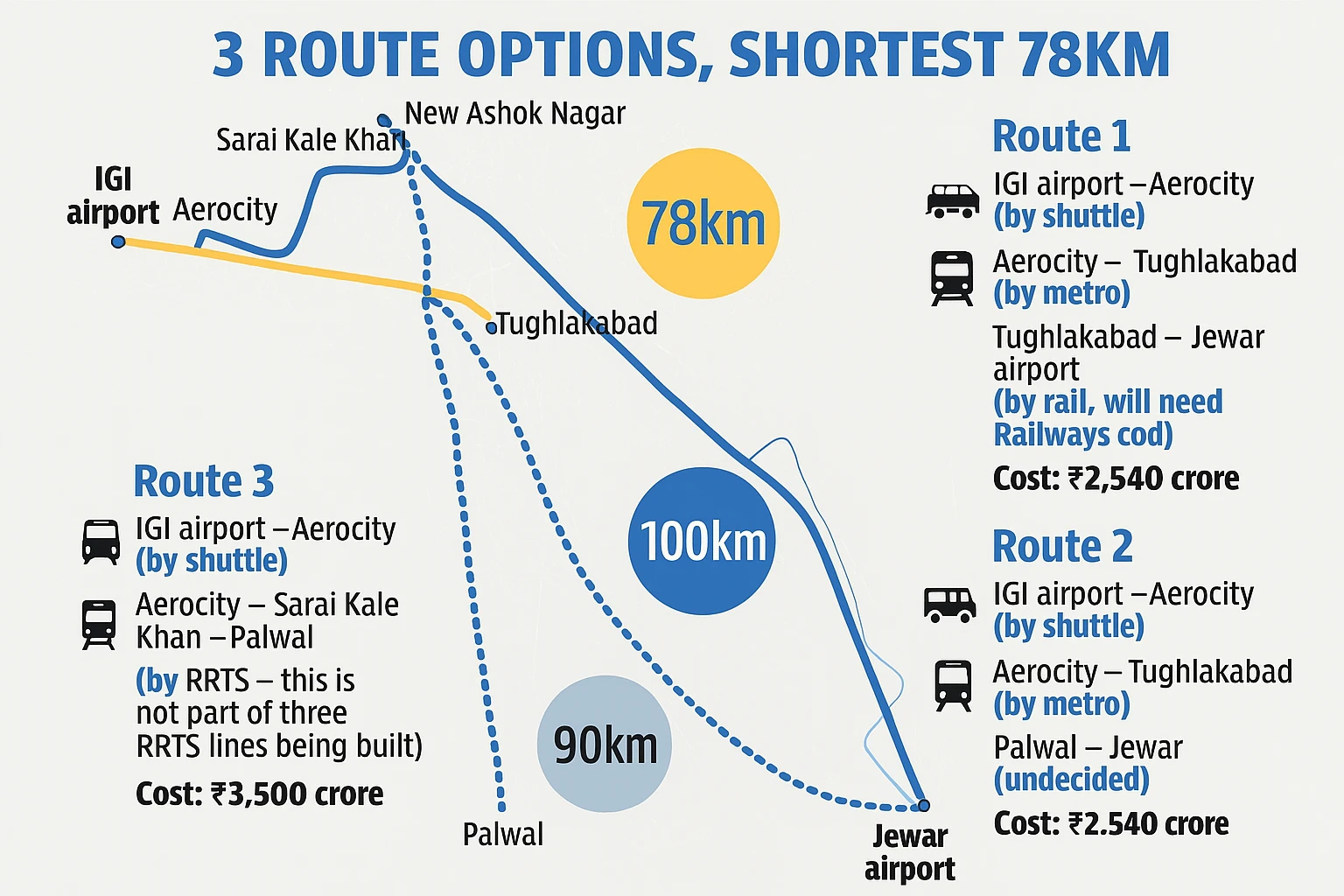
Delhi’s Indira Gandhi International (IGI) Airport and Noida International Airport (Jewar Airport) are set to become India’s first dual-airport system serving the National Capital Region (NCR). With Jewar Airport expected to begin operations soon, seamless connectivity between the two major airports is a top infrastructure priority for travelers, logistics operators, and airlines. The IGI Airport distance to Jewar is currently around 80–90 km by road, but with the upcoming metro, rail, and rapid road transit systems, this travel time is expected to reduce from the current 2.5 hours to just about 60–75 minutes, making airport transfers much faster and more convenient.
What Is the Exact Distance Between IGI Airport and Jewar Airport?
Depending on the route, the distance between IGI Airport and Jewar Airport ranges from 78 km to about 100 km. The shortest and fastest alignment is planned via Tughlakabad, while alternate routes through Palwal and Sarai Kale Khan extend slightly longer.
In current conditions (2025), most road travelers use the Yamuna Expressway or Eastern Peripheral Expressway, with travel time averaging 2 to 2.5 hours. Once the new corridor opens, inter-airport transfer will take less than 90 minutes.
- Jewar vs IGI Airport: 10 Key Differences That Will Decide Your Next Flight
- Is Jewar Airport a Threat to Delhi IGI or a Strategic Partner? The Great Debate Explained
- Jewar Airport Design Comparison: How Its Architecture Compares with Other New Indian Airports
- Jewar Drone Delivery: How Aerotropolis Will Change Last Mile Delivery in India
- Tourism Reloaded: Jewar Airport as the New Gateway to the UP Heritage Arc (Agra, Mathura)
3 Best Route Options Between IGI Airport and Jewar Airport
Explore the top three route options connecting IGI Airport and Jewar Airport via Yamuna Expressway, Eastern Peripheral Expressway (EPE), and NH-48. Know which route saves the most time, offers the best road conditions, and ensures efficient travel.
Route 1 – Tughlakabad Corridor (Shortest Route – 78 KM)
The Tughlakabad corridor is the shortest and most direct connection between Delhi’s IGI Airport and Jewar Airport, covering only 78 km. This route is planned as a high-speed metro and rail alignment, linking Aerocity → Tughlakabad → Jewar Airport. Once operational, travel time is expected to be just about 1 hour 15 minutes, making it the fastest option for passengers. This corridor is particularly beneficial for business travelers, frequent flyers, and air crew who need quick inter-airport transfers.
Apart from passenger travel, this route will enhance air cargo logistics, allowing smooth transportation of goods between the two hubs. By bypassing congested city roads, it will significantly reduce traffic pressure in Delhi, while providing connections to other metro lines for passengers coming from South Delhi, Gurgaon, and Noida. The corridor is part of a broader plan to integrate air, metro, and rail networks, making the IGI–Jewar route one of North India’s most advanced transport links.
Route 2 – Via Palwal & Eastern Peripheral Expressway (~90 KM)
This corridor runs via Aerocity → Tughlakabad → Palwal → Jewar Airport, covering around 90 km. Using the Eastern Peripheral Expressway (EPE) and NH-44, it provides a smooth and safe highway drive, ideal for cargo and long-distance commuters. Travel time is approximately 1 hour 45 minutes. This route bypasses city congestion and integrates with planned metro extensions, offering flexibility for passengers.
It also supports industrial logistics, connecting freight hubs along the EPE corridor and ensuring reliable transport even during peak traffic hours. Well-maintained roads, toll plazas, and service lanes make it suitable for both passenger and cargo movement.
Route 3 – Via Sarai Kale Khan & Palwal (~100 KM)
The Sarai Kale Khan corridor spans about 100 km, leveraging the upcoming Delhi–Meerut RRTS network and metro connectivity. Travel time is expected around 1 hour 30 minutes. While longer, it benefits passengers from East Delhi, Ghaziabad, and Noida by offering direct airport access. This high-speed rail route also eases road congestion and supports freight and passenger transfers efficiently.
Current IGI AIRPORT DISTANCE TO JEWAR(By Road in 2025)
Until the dedicated IGI–Jewar airport corridor and high-speed rail links become operational, road travel remains the primary option for passengers and cargo moving between Indira Gandhi International Airport (IGI) and Noida International Airport (Jewar Airport). As of 2025, travelers must rely on existing highways and expressways, which offer functional but relatively slower connectivity.
Major Highway Options
Currently, travelers between IGI Airport and Jewar Airport primarily rely on three major highways: Yamuna Expressway, Eastern Peripheral Expressway (EPE), and NH-48 (Delhi–Jaipur Highway).
- Yamuna Expressway: Offers a smooth, fast route connecting Delhi to Noida and Jewar, with multiple rest stops, fuel stations, and toll plazas.
- Eastern Peripheral Expressway (EPE): Serves as a ring road around Delhi, reducing city congestion for long-distance travelers heading toward Jewar.
- NH-48: A major national highway that connects Delhi to Jaipur, providing a viable alternative for travelers coming from South Delhi or Gurgaon.
These highways are well-maintained and support FASTag-enabled tolls, making road travel more efficient even during peak hours.
Travel Distance, Time, and Toll Costs
Currently, road travel from IGI Airport to Jewar Airport covers a distance of approximately 115–120 km, depending on the chosen highway and traffic conditions.
- Travel Time: On average, it takes 2 to 2.5 hours by car or taxi. Peak-hour congestion in Delhi and Noida can increase travel time further.
- Toll Costs: Travelers should expect to pay around ₹300–₹350 one way across toll plazas on these expressways.
While these routes are functional, they are not optimal for frequent inter-airport transfers, especially for business travelers or logistics operators who require shorter travel times.
Future Expressway Developments
The upcoming Jewar Airport expressway link is a dedicated road corridor under construction to drastically improve connectivity between IGI Airport and Jewar Airport.
- Expected to be operational by 2026, this expressway will reduce the current travel time to under 90 minutes, making inter-airport transfers much faster.
- It will integrate with existing expressways and peripheral roads, providing multiple entry and exit points for vehicles.
- This development will also ease congestion on the Yamuna Expressway and EPE, benefiting freight, logistics, and passenger travel across the Delhi–NCR region.
Why IGI–Jewar Airport Connectivity Matters
The development of a direct corridor between Delhi’s Indira Gandhi International Airport (IGI) and Noida International Airport (Jewar Airport) is a critical infrastructure project for the Delhi–NCR region. As Jewar Airport prepares to handle domestic and international traffic, efficient connectivity between the two airports will have far-reaching benefits for passengers, businesses, and the overall economy.
Reducing Congestion at IGI Airport
Delhi’s Indira Gandhi International Airport (IGI) currently handles a large share of domestic and international flights. As passenger traffic grows, congestion is becoming a significant challenge.
- The IGI–Jewar corridor will act as a twin-airport system, diverting passengers to Jewar Airport for select domestic and international routes.
- This will shorten wait times, reduce delays, and improve overall passenger experience at IGI.
Enhancing Logistics and Freight Efficiency
Efficient airport connectivity is crucial for cargo and logistics operations.
- Jewar Airport is expected to handle large-scale air freight, and a direct, high-speed corridor to IGI will enable quick transfers of goods and cargo.
- Businesses in Noida, Greater Noida, Gurugram, and Delhi will benefit from faster movement of packages, reducing costs and improving delivery timelines.
FAQs on IGI–Jewar Airport Distance & Routes (2025 Updated)
It varies from 78 km to 100 km, depending on the route. The shortest alignment is via Tughlakabad.
Currently, road travel takes 2 to 2.5 hours, but upcoming rail and metro routes will reduce it to around 1 hour.
The Tughlakabad route (78 km) is the shortest and most direct.
Yes, metro and rapid rail projects are in planning to connect Aerocity, Tughlakabad, and Jewar Airport by 2026–27.
Once Jewar Airport becomes operational, inter-airport shuttle and express services will connect both airports.




